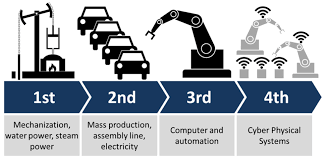
The World of Logistics is Changing…
The world of logistics is changing; the technological advancement in industry is evolving into a more sophisticated arena, which is also pushing the logistics world to accommodate the Industrial 4.0 dream. If you’ve not heard of Industry 4.0 you soon will. ‘Industry 4.0’ makes reference to the next perceived industrial revolution “where smart technology will be used to enhance industrial practices”. The foreseeable impact of this upon the transport sector is as revolutionary, as it is to industry itself.
The Industrial Revolutions
When we look at the previous industrial revolutions, we can then understand the natural progression to where we are now, and where we’re heading. The first three revolutions were the mechanism of power from water (Steam), followed by assembly lines and finally the introduction of computer and automation bringing true mass production. The fourth revolution is the introduction of cyber physical systems.

Industry 4.0 is the vision is to create a smart factory, where machines and sensors talk to each other, exchanging information and making complex decisions for itself. To create a cyber physical system that allows a factory to operate autonomously. This can only happen through collaboration between suppliers, manufacturers and customers. It is crucial to increase the transparency of all the steps from when the order is placed to being delivered, it is therefore necessary to analyse the impact of Industry 4.0 on the supply chain as a whole.
Impact upon Transport
For industry 4.0 to be realised, most enterprise processes must become more digitized. Especially the logistics sector whether it’s supplying the raw materials or delivering the finished product to the customer. A critical element of this is the transparency over location, as on-time logistics become even more critical. The condition of the goods in transport will also become more scrutinised. The logistics industry has not traditionally been at the forefront of IT innovation, despite the fact that as a sector, it has huge potential for benefiting from the application of advanced technology. However with the changes promised, we need to sit up and take note, if only to become a more appealing service over our competitors. This is especially significant since much of the key technology that is required, is already available. Such as one key element being data loggers.
What can data loggers do?

There are many advantages in the use of data loggers to both you and your customer. Namely in protecting the goods you carry; look after those goods, and you will be looking after your business. Currently Data loggers measure an array of parameters such as temperature, humidity, shock, door opening and geo-location. If we take shock as an example, the intensity of shock, its direction and the type, whether free fall, frontal impact or multi axis can be recorded. They also enable the identification of the moment of shock and situation resulting in damage through time-stamping. The more sophisticated systems also allow geo-tagging the moment of shock giving the exact location, which can support real-time transmission via 3G/4G cellular networks. Wireless 3G/4G systems can support settable alarm thresholds, alerting both Head office and the driver of a developing situation before damage occurs, which is specifically of interest to temperature sensitive goods. Historic recorded data can also be used to confirm on the storage condition of goods should a customer enquiry arise.
Should you invest in the future now?

The simple question is, where would you like to take your business? If you want to grow and secure your future business then it’s an obvious yes. Those companies who are first to adapt to a changing market are often those who gain a competitive advantage over the competition. With the assistance of Data Loggers the Pharma and Food sectors are already leading the innovation race by requiring such transparency throughout their logistic cycle. It’s only a matter of time before it becomes a global industry standard.
